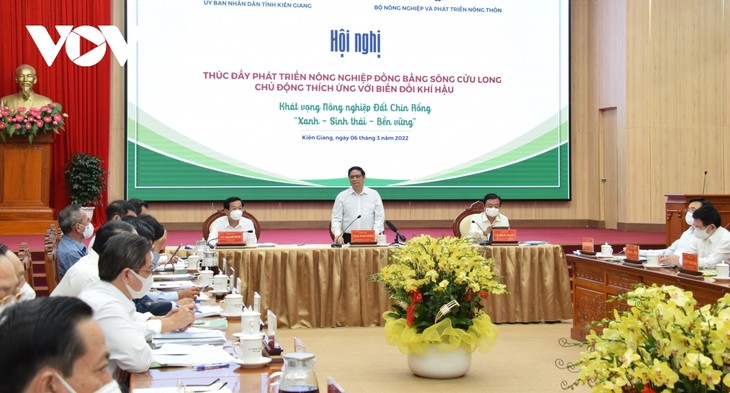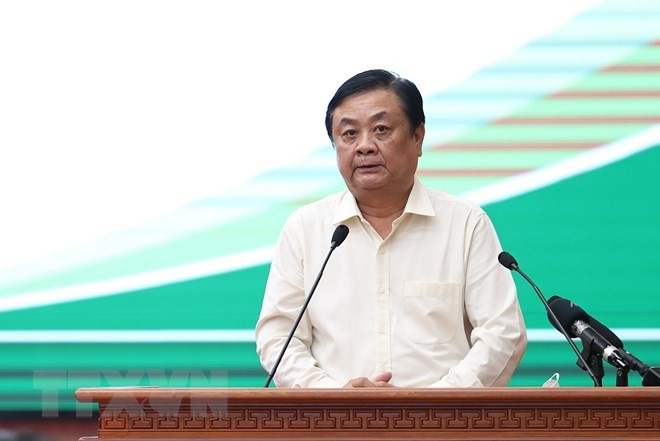(VOVWORLD) - The Mekong Delta is a major hub for production of rice, fruits, and aquaculture, contributing greatly to Vietnam’s agricultural export. But the region is facing development challenges, including climate change and inadequate regional links. At a conference in Kien Giang province on Sunday to promote sustainable development in the Mekong Delta in the face of climate change, Prime Minister Pham Minh Chinh and delegates suggested several ways to tap the region’s potential.
 Prime Minister Pham Minh Chinh speaks at the conference to promote sustainable development in the Mekong Delta (Photo: VOV) Prime Minister Pham Minh Chinh speaks at the conference to promote sustainable development in the Mekong Delta (Photo: VOV) |
The Mekong Delta’s 13 cities and provinces cover 4 million square kilometers – more than 12% of Vietnam’s total area – and contain 19% of Vietnam’s population. The region has great potential, opportunities, and advantages for development. It leads the nation in rice, shrimp, tra fish, and fruit production, and is now moving from an agricultural production mindset to an agricultural economy mindset in order to accelerate its growth.
Breakthrough mindset needed
Developing highly efficient ecological agriculture and modern rural areas is the current orientation for the Mekong Delta. This will require stronger agricultural and industrial production and service links. Service is the key to generating greater agriculture profits. Localities in the region are being urged to treat their natural and human resources as strategic, long-term factors and treat capital, technology, and governance as breakthrough factors for growth. They are also being asked to concentrate public investment and use state resources to mobilize other resources for development.
The localities have been told that good planning will lead to good projects, which will attract good investors. Good investors will in turn ensure better products and stronger brand names for local products like fruits, tra fish, ecotourism, and marine tourism.
The Mekong Delta has an advantage with water transport which has not been fully tapped. Localities in the region are being urged to take advantage of their waterways, build expressways, develop infrastructure adaptive to climate change, and transform energy production toward solar and wind power. Prime Minister Pham Minh Chinh said: "We should focus our investment on strategic infrastructure. Transportation will play a key role. Our region has strong waterway and marine transportation advantages, but we have not fully exploited them. We also need to build expressways and be committed to developing green energy and green products."
Resources should be interconnected
Minister of Agriculture and Rural Development Le Minh Hoan said strengthening links in the Mekong Delta does not just mean linking the populations, areas, and tangible resources of its 13 cities and provinces, but connecting intangible resources, creating a harmonious relation between State, market, and society, and finding new drivers of development.
 Minister of Agriculture and Rural Development Le Minh Hoa (Photo: VNA) Minister of Agriculture and Rural Development Le Minh Hoa (Photo: VNA) |
The Ministry of Agriculture and Rural Development will regulate production planning, standardize materials regions, connect high-tech agriculture investors with in-depth processing investors, strengthen links between sectors, improve cooperatives, directly link production and sales, regulate irrigation systems, and promote digital transformation in agriculture.
The Ministry will also coordinate foreign-funded projects to promote regional links. It is now calling for investment in agricultural and rural logistics projects, including cold chains for agricultural products.
With better transportation, agriculture, and education infrastructure and better human resources, a connectivity mindset will determine the region’s development. Each locality will contribute its own advantages to making the region a driver of Vietnam’s sustainable economic development.